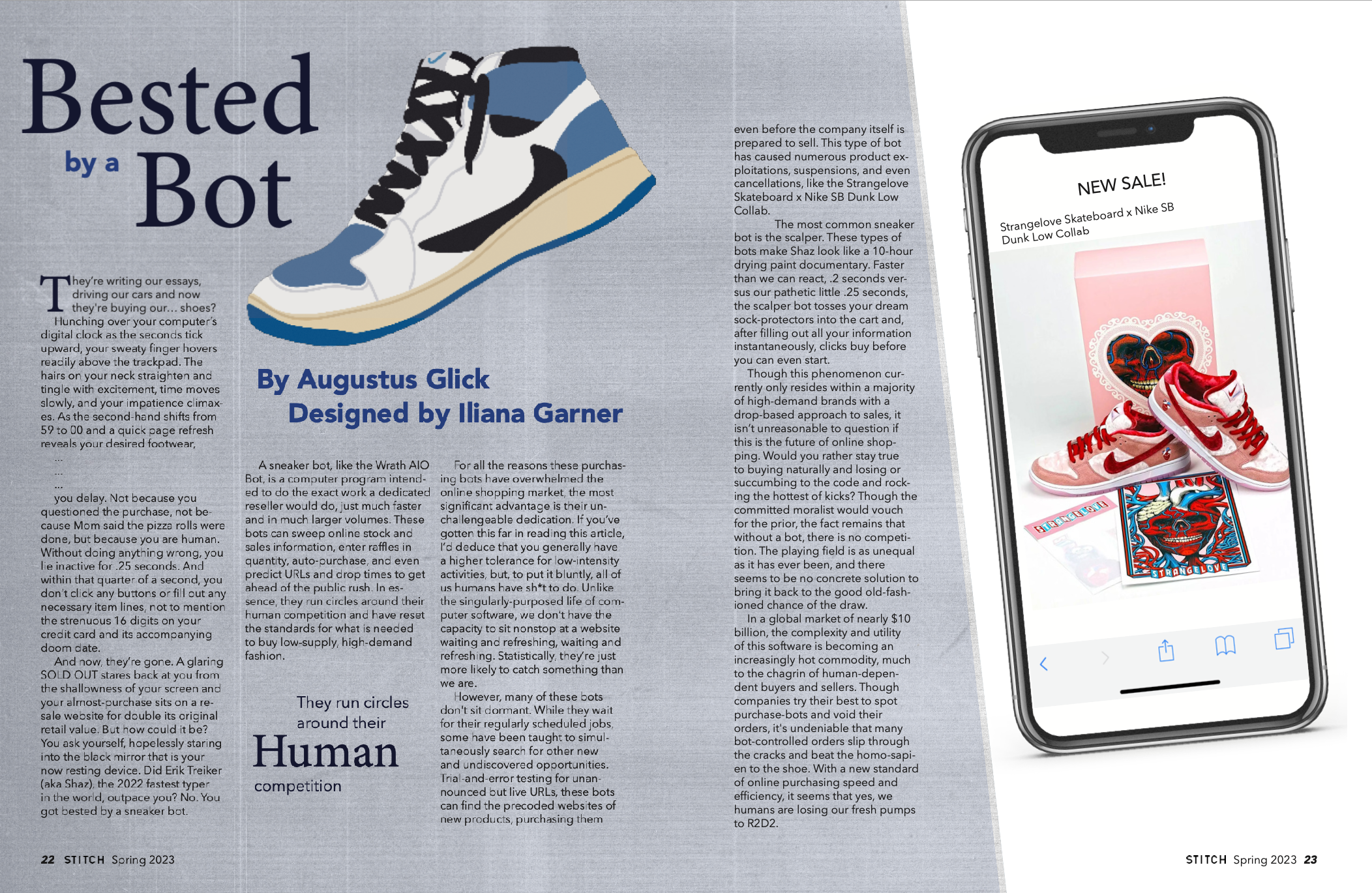Bested by a Bot
They’re writing our essays, driving our cars and now they're buying our... shoes?
Hunching over your computer’s digital clock as the seconds tick upward, your sweaty finger hovers readily above the trackpad. The hairs on your neck straighten and tingle with excitement, time moves slowly, and your impatience climax- es. As the second-hand shifts from 59 to 00 and a quick page refresh reveals your desired footwear,
...
...
...
you delay. Not because you questioned the purchase, not be- cause Mom said the pizza rolls were done, but because you are human. Without doing anything wrong, you lie inactive for .25 seconds. And within that quarter of a second, you don’t click any buttons or fill out any necessary item lines, not to mention the strenuous 16 digits on your credit card and its accompanying doom date.
And now, they’re gone. A glaring SOLD OUT stares back at you from the shallowness of your screen and your almost-purchase sits on a re- sale website for double its original retail value. But how could it be? You ask yourself, hopelessly staring into the black mirror that is your now resting device. Did Erik Treiker (aka Shaz), the 2022 fastest typer in the world, outpace you? No. You got bested by a sneaker bot.
A sneaker bot, like the Wrath AIO Bot, is a computer program intend- ed to do the exact work a dedicated reseller would do, just much faster and in much larger volumes. These bots can sweep online stock and sales information, enter raffles in quantity, auto-purchase, and even predict URLs and drop times to get ahead of the public rush. In es- sence, they run circles around their human competition and have reset the standards for what is needed to buy low-supply, high-demand fashion.
For all the reasons these purchasing bots have overwhelmed the online shopping market, the most significant advantage is their unchallengeable dedication. If you’ve gotten this far in reading this article, I’d deduce that you generally have a higher tolerance for low-intensity activities, but, to put it bluntly, all of us humans have sh*t to do. Unlike the singularly-purposed life of computer software, we don’t have the capacity to sit nonstop at a website waiting and refreshing, waiting and refreshing. Statistically, they’re just more likely to catch something than we are.
However, many of these bots don't sit dormant. While they wait for their regularly scheduled jobs, some have been taught to simultaneously search for other new and undiscovered opportunities. Trial-and-error testing for unannounced but live URLs, these bots can find the precoded websites of new products, purchasing them even before the company itself is prepared to sell. This type of bot has caused numerous product ex- ploitations, suspensions, and even cancellations, like the Strangelove Skateboard x Nike SB Dunk Low Collab. The most common sneaker bot is the scalper. These types of bots make Shaz look like a 10-hour drying paint documentary. Faster than we can react, .2 seconds versus our pathetic little .25 seconds, the scalper bot tosses your dream sock-protectors into the cart and, after filling out all your information instantaneously, clicks buy before you can even start.
Though this phenomenon currently only resides within a majority of high-demand brands with a drop-based approach to sales, it isn’t unreasonable to question if this is the future of online shopping. Would you rather stay true to buying naturally and losing or succumbing to the code and rocking the hottest of kicks? Though the committed moralist would vouch for the prior, the fact remains that without a bot, there is no competition. The playing field is as unequal as it has ever been, and there seems to be no concrete solution to bring it back to the good old-fash- ioned chance of the draw.
In a global market of nearly $10 billion, the complexity and utility of this software is becoming an increasingly hot commodity, much to the chagrin of human-dependent buyers and sellers. Though companies try their best to spot purchase-bots and void their orders, it's undeniable that many bot-controlled orders slip through the cracks and beat the homo-sapien to the shoe. With a new standard of online purchasing speed and efficiency, it seems that yes, we humans are losing our fresh pumps to R2D2.

